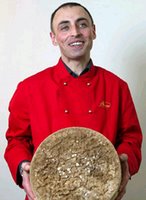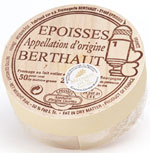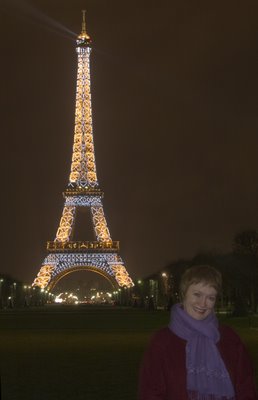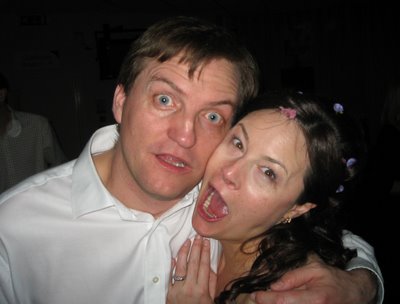We lie to our cheese monger. He’s proud, and we like him. So, we lie to him. We think he appreciates it. We’ll never know.
In a country globally famous for its food, we live in the foodie capital, gourmet central: Paris. Throughout the city, food fetishism is rampant, but it does vary in intensity from neighborhood to neighborhood. The most utilitarian Paris neighborhood is food proud but, then, on another plane, there are neighborhoods that are tantamount to paradise for sensualists: streets for sybarites bounded on both sides by institutions for the indulgent. When we arrived in Paris three years ago, we unknowingly moved in to one of the latter.
 The market where we buy our vegetables is famed even among Parisians. So is the fromagerie -- the cheese shop -- on the same street, which sits behind a prodigiously quaint façade. It’s famous for the quality of its stock, but also for the expertise of its owner, a “maitre fromager”, or cheese master. He wears his reputation proudly but affably, with no hint of the arrogance with which the French are often unjustly saddled by reputation. The market where we buy our vegetables is famed even among Parisians. So is the fromagerie -- the cheese shop -- on the same street, which sits behind a prodigiously quaint façade. It’s famous for the quality of its stock, but also for the expertise of its owner, a “maitre fromager”, or cheese master. He wears his reputation proudly but affably, with no hint of the arrogance with which the French are often unjustly saddled by reputation.
He is a man who greets new customers with something bordering on seduction, and regulars with nearly the intimacy of old lovers. The language of his love-making: rotted milk. Which is, after all, pretty much what cheese is: bacteria-infested dried milk, often with mold growing on it. Yet, to listen to the affectionate dialogues in a fine fromagerie, one is reminded more of amorous longing in a garden of love.
Flame-Haired Angel and I are charmed by the myriad quotidian ways the French show their affection for food. Although it might surprise those who know the French only by stereotype, this is not a people given to affectations about food. Their food talk is not fussily urbane. It is mostly straightforward, often earthy. It’s just that they know so damn much about the subject, it would be hard for them not to sound, well, expert. Even a Frenchman who isn’t the least fascinated by cheese could probably name upward of fifty types. The same is true of wine, of course, but also of things like sausage, pâté, mushrooms and bread. That’s not wanky any more than is a NASCAR fan’s knowledge of engine parts.
Flame-Haired Angel and I enjoy watching just this kind of animated discourse take place in the fromagerie. There is much pointing and tasting and encouragement and debate. With each customer. Over each choice. In America or Australia, this long, word-fuelled purchasing process might be seen as a threat to the pace of business, especially over something as simple as a bit of cheese. In France, of course, it *is* the business, and there’s nothing simple about cheese.
However much we enjoy the debate, it is only partially open to us. Oh, we are embraced by the jovial fromager, but he knows we cannot engage in the rich back-and-forth that is his trade with other customers. We didn’t grow up with four dozen different kinds of goats’ cheese, so celebrating the subtleties of a particularly fine example is lost on us. We can barely remember the basic differences between a few of them from week to week. And that’s without even considering the cow and sheep cheeses. So, he guides us with gently educational proddings, many of them remedial each visit, a little more or less encyclopedic depending on how far the line stretches out his shop door. Some things he has taught us we have nevertheless learned well. One of these lessons concerned a cheese called Époisses.
Époisses (pronounced “ay-PWOSS”) is actually a shortened, familiar version of the cheese’s proper name: Époisses de Bourgogne. Like so many French cheeses, it is named after the village in which it is made, both the place and its product having long, noble histories, involving monks and wars and other pestilence on the French countryside. Despite all, however, Époisses has been made in pretty much the same way for hundreds of years. So dear is it to the French palate, it is affectionately known as the "King of Cheeses" and is now protected by law. Screw with this cheese, and the French authorities will have your ass.
Époisses is considered noble for another reason. France, an obviously cheese-proud nation to be sure, considers Époisses a bit of a test cheese. It’s not for everybody, this Époisses. By which they mean it’s not for the faint of heart. You may think you’ve had a stinky, runny French cheese. I’m here to tell you, you don’t know the French definition of stinky and runny unless you’ve had Époisses.
Flame-Haired Angel and I like strong cheese, and we heard about Époisses early in our Paris tenure. We weren’t sure whether to take the storied extremes of the fabled thing as a beckoning invitation to new heights of cheesy pleasure, or simply as a dare. Either way, it wasn’t long before we were standing in front of our maitre fromager asking, in poor French, for “une belle Époisses”.
Knowing us a little, after weeks seeing us prostrate ourselves before his recommendations, he noted our asking for this famously challenging cheese by name.
“Ah, you know our friend the Époisses?” he asked in bemused French, cocking an eyebrow.
“No, but we’d appreciate an introduction, Monsieur,” I think I replied.
He smiled. “When is this meeting to take place?”
“Tonight. A small romantic dinner. Just the three of us,” I said, trying for a joke with my clumsy French.
 “For tonight, then. This one just here,” he said, picking up a small, round wooden box, “is perfectly ripe today. Tomorrow,” his eyes flashed a little, “who knows?” “For tonight, then. This one just here,” he said, picking up a small, round wooden box, “is perfectly ripe today. Tomorrow,” his eyes flashed a little, “who knows?”
The box sat out on our marble cheese board as we prepared dinner. Almost disappointingly, it didn’t stink. To a close whiff, it gave up a fairly typically cheesy sour-milk smell, but if this was France’s ball-buster of cheeses, it was a let-down.
We were prepared to give the cheese its full due as nobility, nevertheless. After a light meal, we opened a wine chosen especially to be its partner, and we tore small pieces from a resiliently yeasty traditional baguette bought from the best artisan baker (boulanger) in our neighborhood. Only then did we lift the lid off the little round box.
 Inside, filling the box plumply, was a smooth skin of the brightest, most violently fluorescent orange I’ve ever seen on a food other than Cheez Doodles. Both of us were a little taken aback. This wasn't noble livery; it was the colour of a come-on from a cheap hooker. Anything occurring naturally in that colour -- say, on a forest floor -- should be assumed deadly toxic. Inside, filling the box plumply, was a smooth skin of the brightest, most violently fluorescent orange I’ve ever seen on a food other than Cheez Doodles. Both of us were a little taken aback. This wasn't noble livery; it was the colour of a come-on from a cheap hooker. Anything occurring naturally in that colour -- say, on a forest floor -- should be assumed deadly toxic.
It was about then, as Flame-Haired Angel and I recovered our composure from the initial visual assault by the thing we were considering putting in our mouths, that the Époisses announced itself to another of our senses. Its pong had begun to rise.
Perhaps that fragile looking cheese box offered a more effective seal than its appearance had led us to assume. Or, perhaps, at exactly the same moment we lifted the lid, the cheese, having warmed resolutely throughout dinner toward room temperature, reached nuclear critical mass. Whatever the catalyst, the contents of that little box were now filling the room with invisible fumes, as if from a mad scientist’s table-top experiment with -- from the olfactory evidence -- flaming cow assholes.
I would like to claim that the long wordless moments that followed were spent in contemplation of the bouquet of this apparently perfect specimen of French artisanship, a cheese heritage passed down through the centuries. Instead, our specimen seemed to have been rotting for centuries, and we were struck dumb with fear. For, if we were to follow this exploration through to its conclusion, that substance was going to have to pass even closer to our nostrils on its way to our mouths. The thought of what might happen once it was on our tongues was beyond imagining.
But there we were, in Paris, with the Frenchest of French cheeses, its beady orange bloat staring us down with stench. We couldn’t contemplate surrender. We would never be able to face our fathers -- English and American, respectively -- if we let the French get the better of us. Besides, hadn’t we only recently arrived from living in China? And hadn’t we, there, put all manner of stomach-turning nastiness, parading as foodstuffs, into our mouths?
Gamely, I grasped a spoon as though it was a fiery sword of righteousness with which to confront this sulphur-belching demon. Époisses, we had been warned, would make a mockery of any knife. A spoon was required, for, the moist waxy rind being a mere feint, a defensive redoubt with the texture of amphibian skin, the cheese within was pure goo. I placed the blade of the small spoon on the bulging center of the boxed noxious beast, and thrust it through the orange flesh.
It was at this moment that the true aroma of the Époisses offered itself up to us. What belched forth from within was a smell that transcended anything for which our noses had been designed by god. Only Darwinian notions about the survival of the fittest could explain why we did not immediately begin rotting on the spot, the odour eating away our flesh, face-first. If the smell of the un-pierced rind had been bovine anuses aflame, then decomposing intestinal entrails had now been heaped high on the bonfire.
 An ivory-coloured liquid porcelain ooze the consistency of thick mucous flowed out and stuck aggressively to the spoon, which had become difficult to extricate from the sphincter of the cheese. I reached out, rashly, bracing two fingers of my non-spoon hand against the orange rind, peripherally noting its slimy, poison-frog-skin texture, and twisted the spoon out with the other. I half-expected the bowl of the spoon to have corroded away, but it emerged intact with a great blob of creamy effluent, which immediately began sliding down the spoon handle alarmingly toward my bare fingers. Not quick enough to grab for bread, I did the most instinctively reflexive thing: I popped the whole spoonful into my mouth. Bravery didn’t enter into it. I just wasn’t thinking. An ivory-coloured liquid porcelain ooze the consistency of thick mucous flowed out and stuck aggressively to the spoon, which had become difficult to extricate from the sphincter of the cheese. I reached out, rashly, bracing two fingers of my non-spoon hand against the orange rind, peripherally noting its slimy, poison-frog-skin texture, and twisted the spoon out with the other. I half-expected the bowl of the spoon to have corroded away, but it emerged intact with a great blob of creamy effluent, which immediately began sliding down the spoon handle alarmingly toward my bare fingers. Not quick enough to grab for bread, I did the most instinctively reflexive thing: I popped the whole spoonful into my mouth. Bravery didn’t enter into it. I just wasn’t thinking.
So, there it was. In my mouth. I had only two options, both of them bad: I could swallow the unctuous cheese, committing it to my digestive system, or I could leave it on my tongue, committing it to my taste buds. I froze, unable to gather the courage required by either choice. And that’s how the Époisses came to be on my tongue long enough for my brain to begin registering its reaction. What my brain started telling me was garbled and confused, but it was obviously coming from the most unexpected place: the pleasure center.
The Époisses sat there in my mouth oozing and farting extraordinary, subtle cascades of layered flavour: creamy florals, dried fruits, foresty nuttiness, mown fields, and the clean skin of a youthful lover after a warm post-coital doze. Really. It was that good. Sublime. And only ever so faintly cow-y.
Carried away on a magic carpet of gastronomic reverie, I absent-mindedly lifted a wine glass with my non-spoon hand, brought it to my lips, and nearly passed out. My head spun, my stomach turned, my toes curled, and netherward spongy tissue shriveled. In my peripheral vision, I noticed a slimy sheen sweating on the finger tips holding the wine glass. The radioactive rind, now smeared on the glass, was spraying its stench in all directions. My brain was now in a battle with itself, torn between mouth and nose. Must eat more cheese! Must run from the cheese!
I vaulted from the table to the kitchen, threw the wine glass in the sink, disinfected my hands, and got a spoon with a longer handle. Thus armed, Flame-Haired Angel and I proceeded to scarf about half the ambrosial insides of that fetid blob, cautiously avoiding the rind, until we were well stuffed. Sated, we went through two rolls of plastic cling wrap mummifying the box before placing it carefully in the fridge with titanium tongs.
It was the next weekend before we visited the cheese shop again. Our fromager friend perked up immediately when he saw us.
“Ah! And how was your first meeting with our friend the Époisses?”
“It was truly remarkable, Monsieur.”
He looked impressed. “I am so glad I had a good ripe one for you,” he said, turning serious. “So many sell them far too young. It’s just as flavourful and sweet, of course, but the Époisses needs just a little more time to develop its true nobility, robustness and depth of, uh, character.”
Flame-Haired Angel and I looked at each other. It was possible to get all the great flavour but with less of the, uh, character?
We’ve had Époisses many, many times since then. Every time, we approach the question from our friend the maitre fromager in the same way:
“When will you be eating it?” he’ll ask.
“Uh, in about a week,” we lie, grinning in anticipation.

Behold its reddish patina,
Observe the beads of moisture on its sides,
Inhale the subtile aroma so beloved by epicures,
And you’ll agree this is a noble cheese.
Charles Patriat, 1900
Poème sur l’Epoisses (extract, translated)
For more information: The Syndicat de Defense de l'Epoisses
Our fromager is Alleosse.
.. |













